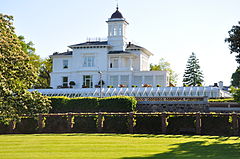Hvidøre (building)
| Hvidøre House | |
|---|---|

Hvidøre
|
|
| General information | |
| Architectural style | Historicism |
| Location | Klampenborg, Copenhagen |
| Country | Denmark |
| Construction started | 1871 |
| Completed | 1892 |
| Client | Frederik Christian Bruun |
| Owner | Novo Nordisk |
| Design and construction | |
| Architect | Johan Schrøder |
Hvidøre House (Danish: Hvidøre ) is a former country house at Klampenborg, just south of Bellevue Beach, on the Øresund coast north of Copenhagen, Denmark. It is most known for serving as the home of Dowager Empress Maria Feodorovna of Russia, daughter of King Christian IX and mother of the last emperor of Russia, Nicholas II, after she was exiled by the Russian Revolution of 1917. It now serves as a conference and training venue for the Novo Group.
At the beginning of the 16th century, King John of Denmark built a royal seat at Hvidøre, guarding the only landing place to the north of Copenhagen. King Christian II used it for his mistress and her mother after his marriage to Princess Elisabeth of Habsburg in 1515.
The castle changed hands many times over the centuries, and was eventually acquired by Counsellor Frederik Bruun in 1871. He demolished it and charged the architect Johan Schrøder with the design of a country house to be built in its place, for use as a summer residence for his family. From then on, the name Hvidøre denoted the house rather than the locality. Hvidøre was built from 1871. Counsellor Bruun died in 1887, but his widow kept Hvidøre until 1906.
In February 1906, King Christian IX's daughters, Queen Alexandra of the United Kingdom and Dowager Empress Maria Feodorovna of Russia, acquired the building for DKK 280,000 to use it as a summer residence during their frequent visits to their native Denmark. They commissioned an aging Johan Schrøder to adapt and modernize the house with modern conveniences such as central heating while the British firm Waring & Gillow was put in charge of most of the interior decorations. A tunnel was also dug to provide direct access to the beach, which belonged to Hvidøre but was separated from it by the coastal road.
...
Wikipedia
